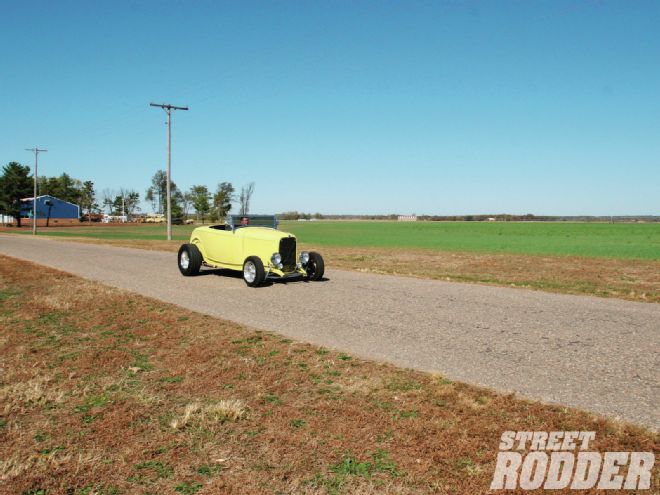
Bret Voelkel is a multifaceted guy. An entrepreneur and astute businessman by nature he’s also a hard-core hot rodder who always liked cars that were low and fast, qualities that could be found in air-bagged cars built in his garage. His efforts with air suspension didn’t go unnoticed and it wasn’t long before others were beating a path to his shop door, which led to the formation of Air Ride Technologies (today that company is known as RideTech), a leader in aftermarket suspension components.
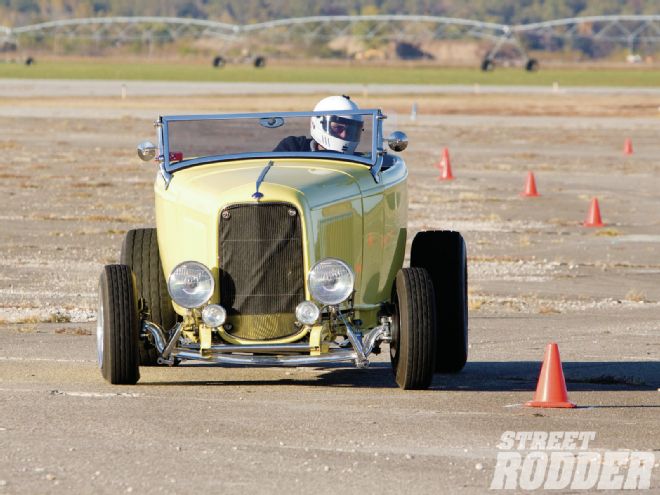 Wayne Thompson, of Evansville, IN, graciously loaned us his ’32 Ford roadster for testing; Bret Voelkel did the driving on the autocross course.
Wayne Thompson, of Evansville, IN, graciously loaned us his ’32 Ford roadster for testing; Bret Voelkel did the driving on the autocross course.
Not one to rest on his laurels, Voelkel is constantly developing and testing new products and recently we were able to see a few of the latest products and try them out.
What’s New?
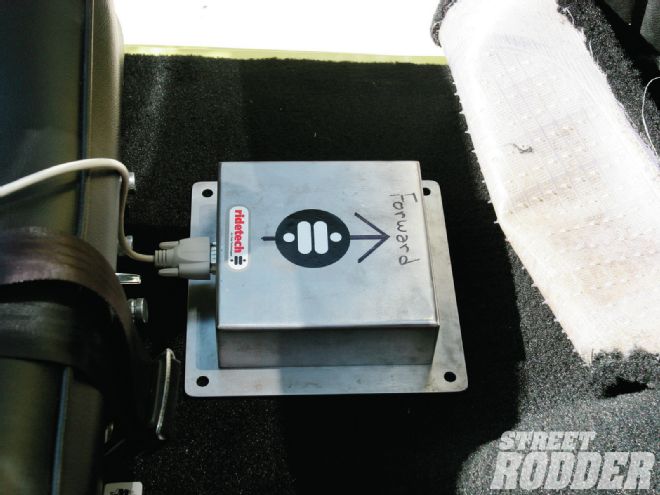 This simple-looking box has the sophisticated internals to collect motion data that can be translated into measurable ride-quality statistics.
This simple-looking box has the sophisticated internals to collect motion data that can be translated into measurable ride-quality statistics.
RideTech’s most basic and least expensive version of the popular ShockWave series the recently introduced Black Series uses a steel body twin tube shock that’s non-adjustable. It provides good ride and handling characteristics with all the advantages air suspension offers.
Master Series is another new air spring design. It uses an aluminum-bodied twin tube shock with single and double adjustability as an option. Single-adjustable versions control rebound (extension) the double adjustable allows both rebound and bump (compression) to be altered.
Select Series is the latest in the air spring designs and features a monotube shock with two sets of electronically controlled valve packs. By using the latest OEM technology, these shocks can switch from a soft, compliant cruise mode to a more aggressive sport setting with the touch of a button. Designed for vehicles that see radically changing loads, such as passengers, luggage, or trailer towing, they’re also great when the canyon-carving mood strikes.
RideTech Coilovers
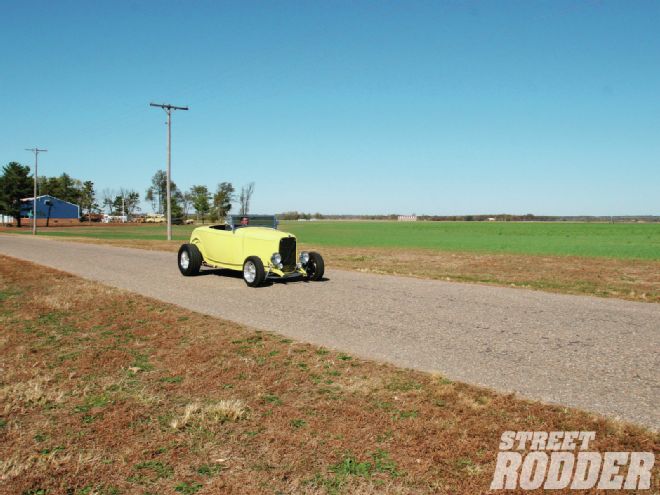 With the recorder on board each set of shocks were tested 35 mph over the same stretch of country road with typical lumps, bumps, and holes. Data was collected in both directions three times for a total of six laps.
With the recorder on board each set of shocks were tested 35 mph over the same stretch of country road with typical lumps, bumps, and holes. Data was collected in both directions three times for a total of six laps.
A departure for the company that became known for air springs, these new coilovers are both affordable and effective. The shocks use an aluminum impact forged body and are a monotube design because in Voelkel’s opinion it allows for a larger piston, which offers better oil control. A large 5/8-inch shaft and oversize rod guides provide piston stability and there are internal bumpstops to cushion the blow if and when the shock tops out during full extension.
Currently RideTech coilovers are being offered in two forms: the non-adjustable version, which features soft valving for a smooth ride; and the adjustable style that has 26 settings for rebound adjustment. Of course choosing springs is critical when selecting coilovers. To help that process RideTech has developed a simple spring-rate calculator that can be downloaded off their website.
Testing
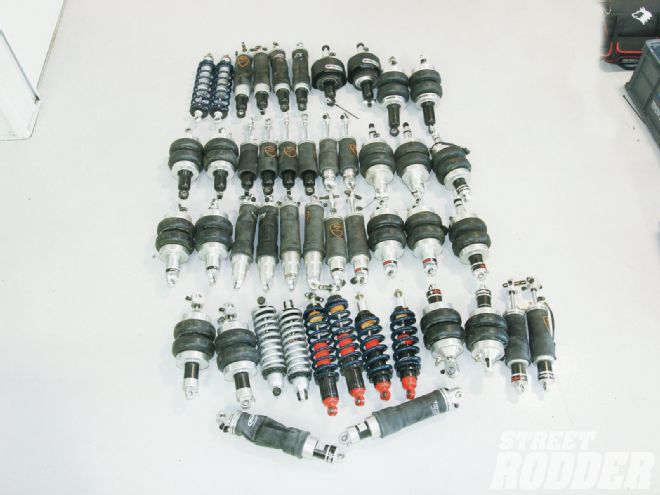 We showed up at the test site equipped with a variety of RideTech’s offerings. Each of our test cars was equipped with three different ShockWaves and the new coilovers.
We showed up at the test site equipped with a variety of RideTech’s offerings. Each of our test cars was equipped with three different ShockWaves and the new coilovers.
To get an idea of how the various RideTech products performed we accompanied the crew to a testing session at the Mid-American Air Center in Lawrenceville, Illinois, where an autocross course had been set up. A variety of vehicles were being tested that day, including Voelkel’s Buick GSX, a Chevy C10 pickup, and of particular interest to us were two street rods, a ’32 Ford roadster and a ’34 coupe. The testing consisted of timed runs around the autocross course and ride quality evaluations on nearby roads.
Although it’s not likely that many street rodders will turn out for a day at the track, how well your car handles is important. Trimming lap times may not be a priority, but being able to negotiate a corner or an off-ramp at speed safely and securely, especially when you’re going faster than may be prudent, or when that unexpected evasive maneuver to miss a bus full of nuns becomes necessary, great handling becomes a valuable trait. Not to mention it makes driving a lot more fun.
Comparing suspension components still involves a stopwatch and a closed course and the process produced some interesting data on our two test vehicles. The ’32 had solid axles on both ends, a transverse spring with conventional shocks up front and coilovers in the rear; it received changes in the rear suspension only.
Equipped with a competitor’s coilovers, base performance numbers for the roadster were established with three separate timed runs. Changing to Black Series resulted in times comparable to the original coilovers. Next up were the Master Series, which yielded slightly better times as the car appeared to understeer less going into the corners. Installing the Select Series brought about the biggest improvement, with a noticeable change in cornering ability when the firm position was selected. Body roll was noticeably reduced as was initial understeer. Of course with all the combinations the small-block Chevy had more than enough power to bring the rear end around, producing oversteer as our test driver, Bret Voelkel, repeatedly demonstrated.
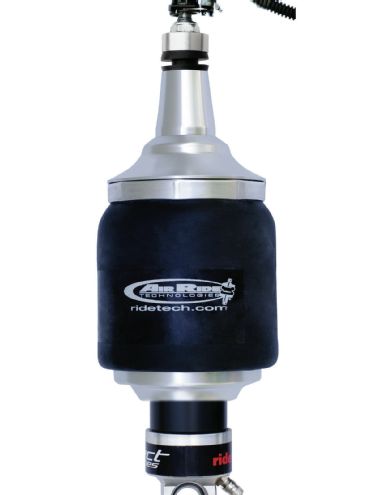 RideTech has incorporated the latest in OEM technology in the Select Series. Simply pushing a button on the dashboard changes the shocks valuing from soft to firm.
RideTech has incorporated the latest in OEM technology in the Select Series. Simply pushing a button on the dashboard changes the shocks valuing from soft to firm.
Our final test was one of the most interesting. The RideTech coilovers generated times comparable to the original shocks and similar to the others with the exception of the Select Series on firm, but there was more to learn during ride testing.
’32 Ford Street Rod Top Times Driver: Bret Voelkel Black Series 56.516 57.486 57.643 Master Series (SA) 55.980 56.122 57.005 Select Series (soft) 55.273 56.220 56.602 Select Series (firm) 54.721 54.782 55.511 Original Coilovers 56.129 56.648 57.037 RideTech Coilover 56.034 56.727 57.241
’34 Ford Street Rod Top Times Driver: Bret Voelkel Black Series 59.936 61.417 62.039 Master Series (SA) 57.581 59.415 60.277
Unfortunately track testing with the ’34 was cut short by a transmission problem but one thing was clear from the outset: the coupe needed stiffer suspension to control body roll. With independent suspension up front and a solid axle in the rear we began testing with the Black Series and found it leaned badly enough in the corners to look as though the running boards were in jeopardy of dragging on the ground. Switching to the Master Series reduced lap times considerably, made the car much easier to drive, and reduced the howl of protest from the tires in each and every corner. The increased compression and rebound damping offered by the Master Series helped considerably, but on this car antiroll bars would be advisable to get the most out of the suspension.
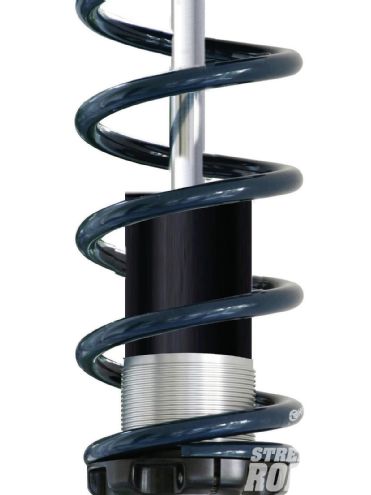 A hint of things to come? RideTech coilovers with Select Series shocks.
A hint of things to come? RideTech coilovers with Select Series shocks.
Ride Quality
Assessing ride quality is a seat-of-the-pants operation for most of us, but not for RideTech. They use a means of evaluation based on technology developed by NASA to measure the frequency of movement space shuttle astronauts were subjected to. That technology has been adapted by OEM automotive engineers to aid in suspension development and is used by RideTech as well. Simply put, accelerometers measure the vertical, horizontal, and lateral movements of the car, as well as pitch and roll and convert those five readings into a numberthe lower the number the better the overall ride quality. For this part of the testing the two cars were driven back and forth over the same section of road three times at 35 mph, the data was collected and printed out as a total ride quality number. We can honestly say the seat of our pants agreed with the data collected, and lower numbers really do indicate better overall ride quality.
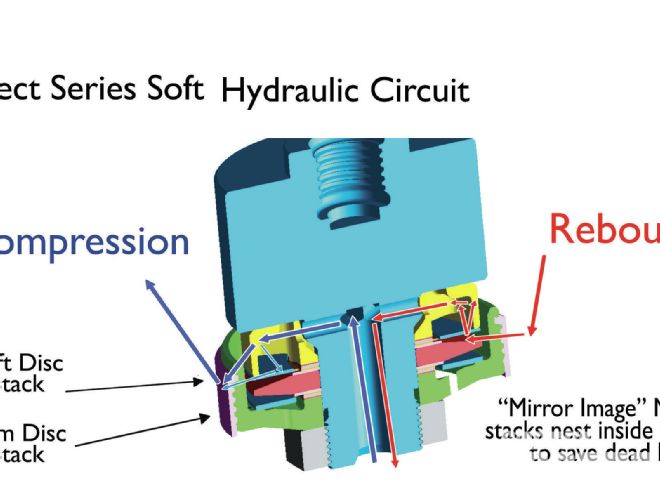 An electromagnetic coil inside the Select Series changes the disc stack that the oil flows through, which alters the damping action of the shock. Here the valve is in the soft mode.
An electromagnetic coil inside the Select Series changes the disc stack that the oil flows through, which alters the damping action of the shock. Here the valve is in the soft mode.
Again the ’32 was first up and not surprisingly the softer the suspension the better the ride. However, that’s only true up to a pointtoo soft and the car will begin to pitch up in the rear and roll side to side and the ride quality will suffer.
As we had found on the autocross course, the RideTech coilovers and the originals performed similarly, yet the ride quality was vastly different as the test results show. The springs on the original shocks were extremely stiffand while they worked well on the autocross course they scored poorly on the street, as every bump was transmitted to the electronic sensors as well as the ones in the seat of our pants. We concluded the RideTech coilovers were better overall because they had lighter springs for a better ride with much more effective damping on compression and rebound, which helped handling. Again the ability to adjust damping proved its worth and ride quality was vastly improved.
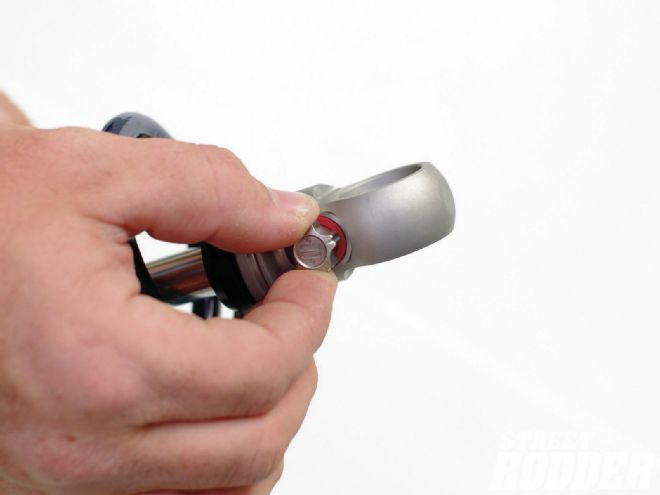 The coilovers rebound adjustment knob has 26 positions. While compression damping is fixed, spring rate changes are easily accomplished by swapping coils.
The coilovers rebound adjustment knob has 26 positions. While compression damping is fixed, spring rate changes are easily accomplished by swapping coils.
Of all the results of the ride test the most surprising came with the installation of the Black Series shocks; it was immediately obvious that the combination of the air pressure necessary to obtain the proper ride height and the compression damping was not appropriate for this car as they scored poorly and the car pitched up in the rear from not enough rebound dampening. On the other hand, switching to the single a Master Series again proved the value of adjustable shocks, we were able to adjust the air pressure and dial in the damping to come up with the second best ride quality score.
'32 Ford Roadster ShockRide Meter Comparison Shock Series Average Ride Meter # Black Series 16.363 Master Series SA 13.985 RideTech Coilovers 12.822 Original coilovers 15.219
Road testing the coupe also provided a few surprises. The Black and the single-adjustable Master Series produced very similar results. In this case having rebound adjustment wasn’t an advantage; it was the compression stroke that needed to be softened. Switching to the Select Series on the soft setting provided a noticeable improvement and the standard RideTech coilovers scored slightly better.
'34 Ford Roadster ShockRide Meter Comparison Shock Series Average Ride Meter # Black Series 10.03 Master Series SA 10.621 RideTech Coilovers 8.767 Select Series 8.977
Our Conclusion
First and foremost RideTech’s new coilovers are winners. They’re a clean, simple, affordable suspension option that works extremely well. Like any coilovers, proper spring selection is critical, which means first you have to weigh both ends of your carguessing won’t get it done. Then use RideTech’s online calculator to determine the right spring for your application. Preload collars on the shocks provide some adjustability, and springs themselves cost around $75 each, so trying different sets won’t break the bank.
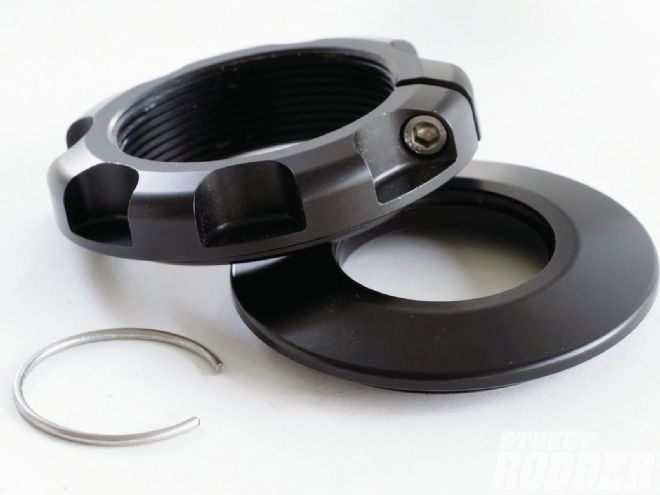 RideTech’s coilovers feature a unique preload adjustment collar (top) that feature a pinch bolt to lock them in position.
RideTech’s coilovers feature a unique preload adjustment collar (top) that feature a pinch bolt to lock them in position.
As for air suspension it’s obviously more involved to install than coilovers and more expensive as well, however it does provide a wide range of adjustability in ride height and ride quality, especially when double-adjustable shocks are part of the package.
On the subject of adjustability the fact is most of us aren’t going to crawl under our car to play with shock settings very often, but the ability to dial in the suspension (and then leave it alone) is an asset when it comes to fine-tuning a chassisand while a single adjustment helps, double adjustment provides even more options. Then there’s the latest in OEM technology, the option to switch from soft to firm shock valving with the push of a button, great for those who want to switch from a soft ride for comfort and stiffer suspension for handling.
So there you have it, there’s plenty to choose fromairbags or coil springs, shocks that aren’t adjustable, or those that can be altered from under the car or the driver seat. Basically as the sophistication of the components increases so does the cost, so take what we’ve shown here and let your needs, and your pocketbook, be your guide.
Pete Swain’s ’34 coupe exhibited considerable body roll on the autocross course. Predictably, increased compression damping and higher air pressure helped cornering but hurt ride quality in later testing.
'32 Ford Street Rod Top Times Driver: Bret Voelkel Black Series 56.516 57.486 57.643 Master Series (SA) 55.980 56.122 57.005 Select Series (soft) 55.273 56.220 56.602 Select Series (firm) 54.721 54.782 55.511 Original Coilovers 56.129 56.648 57.037 RideTech Coilover 56.034 56.727 57.241